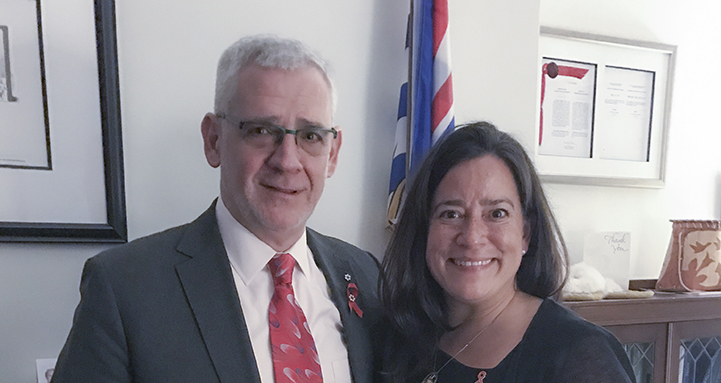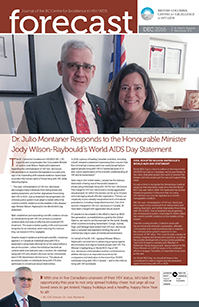
The BC Centre for Excellence in HIV/AIDS (BC-CfE) supports and congratulates the Honourable Minister of Justice Jody Wilson-Raybould’s statement regarding the criminalization of HIV non-disclosure. Her promise to re-examine the legislation is a welcome sign of an impending shift towards evidence-based laws to protect the human rights of those living with HIV, while reducing stigma.
“… The over-criminalization of HIV non-disclosure discourages many individuals from being tested and seeking treatment, and further stigmatizes those living with HIV or AIDS. Just as treatment has progressed, the criminal justice system must adapt to better reflect the current scientific evidence on the realities of this disease,” says Minister Wilson-Raybould in her World AIDS Day statement.
Well-established and expanding scientific evidence shows an individual living with HIV can achieve a sustained undetectable viral load on effective and sustained HIV treatment. This leads to better quality of life and improved longevity for an individual, while reducing the chances they can transmit HIV to negligible.
Despite research evidence and broad scientific consensus against it, in Canada an individual living with HIV is expected to proactively disclose his or her status before a sexual encounter—unless the individual has both an undetectable viral load and uses a condom. An individual living with HIV who doesn’t disclose can be criminalized, even if HIV transmission did not occur. This places an excessive burden on individuals living with HIV who participate in consensual sexual relationships.
In 2014, a group of leading Canadian scientists, including myself, released a statement expressing their concern that “the criminal law is being used in an overly broad fashion against people living with HIV in Canada because of, in part, a poor appreciation of the scientific understanding of HIV and its transmission.”
Next only to the United States, Canada has the dubious distinction of being one of the world’s leaders in prosecuting individuals living with HIV for non-disclosure. The charge for HIV non-disclosure is mostly aggravated sexual assault, for which the penalty can be up to 10 years and a damaging sexual offender registration. The law can negatively impact already marginalized and criminalized populations, including marginalized women. Out of 14 women charged for HIV non-disclosure in Canada, 10 have been charged with aggravated sexual assault.
If Canada is to be a leader in the effort to reach an AIDS-free generation, as established as a goal by the United Nations, we need to set the example for the world. Already, other countries including Switzerland, Congo, Guinea, Togo, and Senegal have revised their HIV non-disclosure laws or adopted new legislation limiting the use of criminal law only to cases of intentional transmission.
On behalf of the BC-CfE, I applaud Minister Wilson-Raybould’s commitment to advancing progress against discrimination and stigma towards people with HIV. The Minister’s highlighting on World AIDS Day of HIV non-disclosure criminalization and her commitment to address this law as an important issue show her compassion and dedication to the more than 70,000 individuals living with HIV in Canada — and to the millions living with HIV worldwide.

